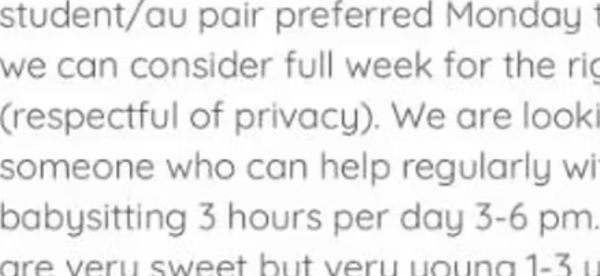
In a bizarre twist of events, a couple living in South London faced mockery after publishing a job listing for a live-in babysitter who would, surprisingly, have to pay them £400 for the privilege. This eyebrow-raising proposition, initially seen as an appealing rental opportunity in Clapham South, quickly revealed a significant catch.
Prospective renters were initially enticed by the seemingly affordable £400 per month room, only to discover that there was a significant condition attached. The chosen tenant would be required to be on standby as a babysitter for three hours every day, specifically from 3 pm to 6 pm, Monday to Friday. Weekends were excluded, meaning the babysitter could only stay in the house if they were caring for the children.
The advertisement, which gained widespread attention before being taken down, shed light on the couple’s unusual requirements. They described themselves as an Italian family seeking a student or au pair, emphasizing their preference for weekday availability. However, they also mentioned a degree of flexibility for the right candidate who respected privacy.
The potential tenant would be allotted a small 9-square-meter room and a dedicated bathroom primarily for personal use while the family used a separate bedroom. This unusual arrangement indicated the lengths to which the couple was willing to go in exchange for help with childcare.
After receiving significant backlash for their original listing, the couple re-posted the rental on Spare Room with a revised description. The monthly rent was initially increased to £600 but eventually settled at £500, with no mention of babysitting duties this time.
The new advertisement presented the rental as a more conventional offering, highlighting the features of a double room with a shared bathroom and access to the living room and kitchen. It emphasized the importance of cleanliness, organization, and respectfulness from potential tenants.
The initial advertisement sparked outrage on social media, with many expressing their dismay at the undervaluation of caregiving work. One commentator lamented the disparity in how caregiving roles are compensated compared to other professions, highlighting the immense responsibility that caregivers bear.
In a sarcastic commentary on the situation, another observer jokingly suggested that the £200 price difference between the original and revised listings could serve as compensation for the babysitting duties. This observation underscores the complex societal attitudes towards caregiving and domestic work.
Ultimately, the story of the South London couple and their unusual rental listing serves as a poignant reminder of the broader issues surrounding labor, compensation, and the intricacies of domestic arrangements in modern society.





